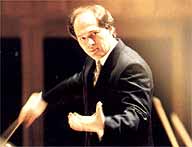 In a well-filled Kennedy Center Concert Hall, the National Symphony Orchestra shot the opening concert salvo under conductor Roberto Minczuk. With the warning signs prominently displayed, “All-Tchaikovsky-Program,” it should not have come as a surprise… but the NSO’s “Prelude Festival” concert of the Eugene Onegin Polonaise, the Fourth Symphony, and the unavoidable First Piano Concerto proved to be… a lot of Tchaikovsky.
In a well-filled Kennedy Center Concert Hall, the National Symphony Orchestra shot the opening concert salvo under conductor Roberto Minczuk. With the warning signs prominently displayed, “All-Tchaikovsky-Program,” it should not have come as a surprise… but the NSO’s “Prelude Festival” concert of the Eugene Onegin Polonaise, the Fourth Symphony, and the unavoidable First Piano Concerto proved to be… a lot of Tchaikovsky.It was the kind of concert that makes the difference between a music critic and a reviewer very clear. No need for the former here. No one, in 2006, needs to be told about the relative merits of Tchaikovsky’s piano concerto. The temptation to editorialize is great (“If the animals that are the great composers are all equal – and some animals are more equal than others… Tchaikovsky would not be among the latter…”) but is best resisted.
Better to make note of a capably played Polonaise, op. 24, and a Fourth Symphony that suffered from unpleasantly glaring brass (making up in decibels what was lacking in refinement) but otherwise made its brash points with enthusiasm and diligence. The third movement, a pizzicato orgy, was most amiably plucked and the rambunctious, extra-loud finale spurned people on to the usual standing ovations.

Joyce Yang, Van Cliburn Competition 'Recital' |
Tim Page, Tchaikovsky Gets NSO Off to a Rousing Start (Washington Post, September 8) |
Trying to prove that promise in the most overplayed concerto in the repertoire is a tall order – but there were enough hints towards the extraordinary in Ms. Yang’s playing that the promise was kept alive. Accented, marked notes purled off the keyboard, emphasizing the more interesting voices, resisting the urge to play primarily loud (unlike Natasha Paremksi earlier this summer), and a general liveliness and tastefulness made the oft-heard work flitter by fast enough. Even if the violins drowned the soloist out in the first movement (a movement composed to elicit applause and succeeding in doing so on Thursday night) and even if the orchestra needed a while to get together, this was a “Tchaik-One” performance well above average. A repeat performance will take place today, Friday, at 7PM.